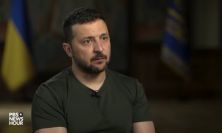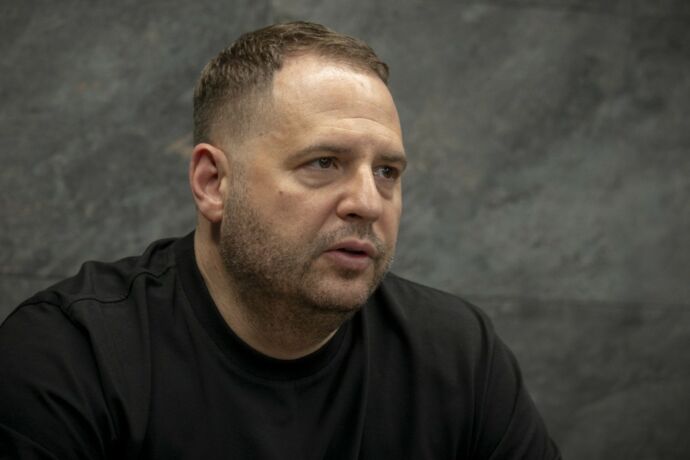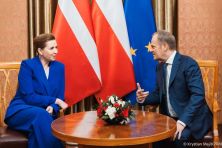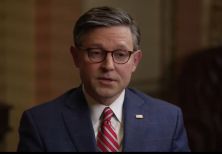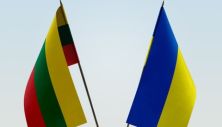Ladies and Gentlemen, thank you for the opportunity to speak here today.
For three months now, we have been resisting one of the world’s largest armies. I am sure you are among those Europeans who do not need explanations why we are doing this. You just know it. If suddenly not – you can ask Bono and Edge of U2 about it. They played in the Kyiv metro while an air alarm sounded on the surface. They saw everything. And when Bono said that we are fighting not only for our own, but also for your freedom, he was right. This is actually true. Today, without exaggeration, we are the shield of Europe.
Ireland was among those states that extended a helping hand to Ukraine in the first hours of the full-scale Russian invasion. We are very grateful to the people and Government of Ireland for their support, for the immediate abolition of visas and for the creation of the most favorable conditions for refugees from Ukraine. We are also thankful for the consistent position that the Republic of Ireland has taken throughout the eight years of Russian aggression against Ukraine on the need to comply with international law and non-recognition of the annexation of illegally occupied territories of our country.
In these eight years, the world has failed to stop Russia. It failed to restrain its imperial intentions. Unpunished evil always becomes stronger, always becomes more ambitious.
But Ukraine did not surrender. It has been resisting for more than three months already. The Kremlin cannot conquer it. And so it resorted to the destruction. It began to destroy its industrial and economic potential. Regular missile and air strikes, artillery shelling of settlements and critical infrastructure are carried out exactly for this purpose.
The looting of the occupied territories of Ukraine is large-scale and systematic. And this indicates that looting is the basis of Russia’s public policy in these lands. Hundreds of thousands of tons of Ukrainian grain have already been taken to Russia from the southern regions, which are under the control of Russian troops. At the same time, Russia refuses to provide green corridors for the export of our agricultural products. This is an obvious blackmail of the world community with food shortages, as before the war Ukraine was the guarantor of food security for 400 million people on the planet.
This is already the fourth type of blackmail used by the Kremlin during the aggression against Ukraine. It was preceded by threats of energy shortage in the European Union, a possible catastrophe at one of the seized Ukrainian nuclear power plants, and a nuclear strike. We do not know what else Russia’s actions in its longing for domination can lead to. But we know for sure: it must be stopped.
It is very difficult for us now. As a result of hostilities, 5 million people left the country. The number of internally displaced persons is the same. Tens of thousands of civilians have been killed in the Russian invasion. The war took away 35% of Ukraine’s GDP. We lost more than 200 factories. Our direct losses today exceed $ 600 billion.
Nevertheless, Ukraine continues to defend itself. Fierce fighting continues in the east and south. We have to win. Otherwise, Ukraine will simply disappear as a nation and as a state. The more help the international community provides, the closer our victory is. Any help – military-technical, political, financial or humanitarian.
An extremely strong support for Ukraine in deterring aggression is increasing sanctions pressure on Russia. I would like to talk about the International Expert Group set up at the initiative of President Zelenskyy, which I have the honor to chair with Ambassador Michael McFaul, and which has already presented two documents: the Sanctions Strengthening Plan and the Sanctions Roadmap, which contain detailed recommendations for a coordinated and coherent sanctions policy.
Ukraine welcomes the EU’s move to implement the Sixth Sanction Package. A key part of it is a complete embargo on Russian oil. This should be done as soon as possible. Energy accounts for the lion’s share of Russia’s budget revenues. So, buying them, Europe is financing the Russian military machine.
The European Union is responding to Russia’s aggression by gradually building up sanctions and gradually increasing arms supplies to Ukraine. It is too long and inefficient. We propose to change the approach. It is necessary to do what the Russians do not expect. A massive sanctions strike, intensified by the maximum number of heavy weapons for the Armed Forces of Ukraine, will not only help save thousands of lives. It will also help avoid a protracted war, for which Russia has already prepared. We ask you to convey to the partners in the European Parliament the importance of such an approach. We will also be grateful for the political and any other assistance in obtaining the weapons that Ukraine desperately needs.
Equally important is the fact that the continuation of sanctions pressure on Russia will serve as a safeguard against further attempts at aggression against Ukraine, along with other security guarantees mechanisms. The relevant expert group, which I co-chair with former NATO Secretary General Anders Fogh Rasmussen, is already working on possible ways to establish these mechanisms. We would be glad to see representatives of Ireland – a country with extensive experience in peacekeeping – in it.
Availing myself of this opportunity, I would like to congratulate Ireland on its Chairmanship of the Council of Europe’s Committee of Ministers. But I would like to propose that the Committee’s agenda include compliance by Member States with their obligations under the common sanctions policy. Investigating the crimes of Russian troops could be another issue on Ukraine’s agenda of the Committee.
I think it is no exaggeration to say that Ireland is Europe’s technological and financial hub. Sometimes transnational companies try to do business as usual until the last opportunity. But in the case of Russia, business as usual is promoting aggression. No matter what the business is. Moscow has repeatedly demonstrated its ability to use even humanitarian cooperation as part of a hybrid war. We must not forget that this always ends in provocation of civil conflicts, sabotage and political assassinations.
When we ask for help, we are not talking about charity. This is an investment. In common European security. In a common European future. It is from such positions that we consider the prospects of joining the EU.
Ukraine paid a very high price for its choice. And still continues to pay. And in this matter, every vote in support of it is important. Therefore, I would like to ask those present here to make every effort to turn Ukraine’s European perspective into a reality as soon as possible.
We have often heard that Ukraine’s accession to the EU is hampered by corruption. Well, it’s true: Russia-incited corruption in the EU has indeed become a stumbling block for us. But this must end.
We were delighted with the actions of your fishermen, who protected the exclusive economic zone of Ireland from the exercises of the Russian fleet. It was a very elegant and beautiful move. Certainly, the glorious Irish cleverness will be useful to Ukrainians. Both today and after the war, when we will rebuild our green country. I bet Johnny Cash could count 40 shades of green in Ukraine as well – at least once every six months.
Our government is already working on the U24 Recovery Plan. Ukraine’s reconstruction will be based on two principles: regional and parametric. The regional principle will be based on the help of partners to rebuild a particular region, city or community. Parametric means that the restoration will take place according to modern parameters and standards of the European Union. We invite Ireland to participate in this program. Following President Volodymyr Zelenskyy, I invite Ireland to help us with the restoration of the Kherson region.
We have a very wide space for cooperation. Agriculture, pharmaceuticals, food industry, mechanical engineering, services – you name it.
I will place a special emphasis on the capabilities of the IT sector. Even before the war, Ukraine introduced a revolutionary tax regime in this area – Diya.City. It continues to work effectively even in the current circumstances.
Our future security will depend, among other things, on our ability to adapt and implement technologies such as artificial intelligence, autonomous management and cybersecurity. Ukraine could cooperate with Ireland as a high-tech country on these issues.
As you say, success is about getting up one time more than falling. This is exactly what we need. So help us get up. I am sure you will see that Ukraine knows how to show its gratitude.
Thank you very much for your attention!
